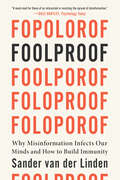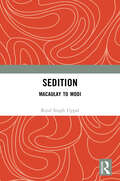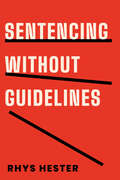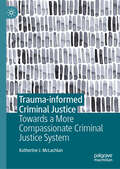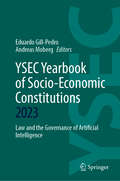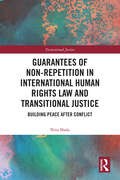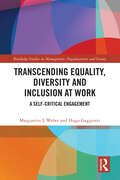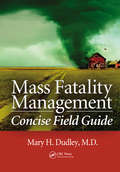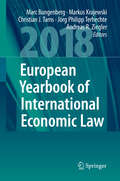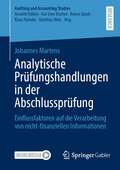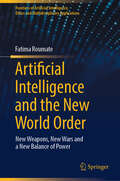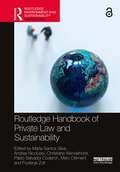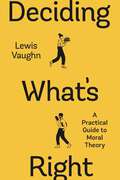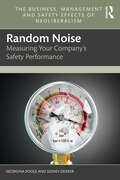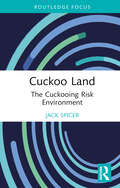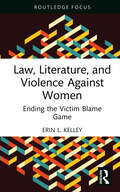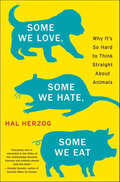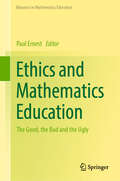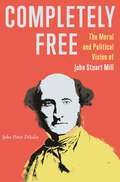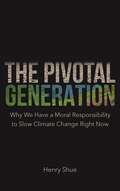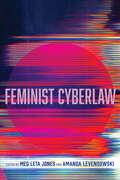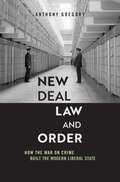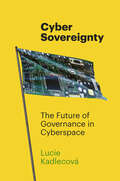- Table View
- List View
Foolproof: Why Misinformation Infects Our Minds And How To Build Immunity
by Sander van der LindenWinner of the 2024 Harvard Goldsmith Book Prize • Winner of the 2024 Nautilus Book Award • A Next Big Idea Club Must-Read • A Financial Times Best Book of the Year • One of Nature’s best science picks • One of Behavioral Scientist’s Notable Books of 2023 Informed by decades of research and on-the-ground experience advising governments and tech companies, Foolproof is the definitive guide to navigating the misinformation age. From fake news to conspiracy theories, from inflammatory memes to misleading headlines, misinformation has swiftly become the defining problem of our era. The crisis threatens the integrity of our democracies, our ability to cultivate trusting relationships, even our physical and psychological well-being—yet most attempts to combat it have proven insufficient. In Foolproof, one of the world’s leading experts on misinformation lays out a crucial new paradigm for understanding and defending ourselves against the worldwide infodemic. With remarkable clarity, Sander van der Linden explains why our brains are so vulnerable to misinformation, how it spreads across social networks, and what we can do to protect ourselves and others. Like a virus, misinformation infects our minds, exploiting shortcuts in how we see and process information to alter our beliefs, modify our memories, and replicate at astonishing rates. Once the virus takes hold, it’s very hard to cure. Strategies like fact-checking and debunking can leave a falsehood still festering or, at worst, even strengthen its hold. But we aren’t helpless. As van der Linden shows based on award-winning original research, we can cultivate immunity through the innovative science of “prebunking”: inoculating people against false information by preemptively exposing them to a weakened dose, thus empowering them to identify and fend off its manipulative tactics. Deconstructing the characteristic techniques of conspiracies and misinformation, van der Linden gives readers practical tools to defend themselves and others against nefarious persuasion—whether at scale or around their own dinner table.
Sedition: Macaulay to Modi
by Rijul Singh UppalThe liberal use of the sedition law in recent years, mainly by state governments intolerant of dissenting opinion, has provoked justified controversy. After some prominent individuals fell afoul of the law, activists, journalists, lawyers, and jurists took up cudgels on behalf of the victims, and demanded that the law be scrapped, as it belongs to the colonial era. The Supreme Court of India, in May 2022, admitted a host of petitions challenging the law as upheld in Kedar Nath Singh vs Union of India, 1961.The author believes that the fundamental right to free speech is a non-negotiable right in a democratic country, but the law is relevant for countering threats to national security and sovereignty. Examining the trajectory of the sedition law from its introduction by the British colonial power and its subsequent rejection by the Constituent Assembly of India, the author observes that the statute had to be hastily restored by the Provisional Parliament to cope with the challenges posed by communal rioting in many parts of the country, several years after independence. As such, it is pertinent in times of crisis. The current law undeniably needs safeguards against political misuse, but deserves a place on the statute.Print edition not for sale in South Asia (India, Sri Lanka, Nepal, Bangladesh, Pakistan and Bhutan)
Sentencing without Guidelines
by Rhys HesterSentencing matters. Reform initiatives hope to impart more uniformity and fairness in sentencing. Tough-on-crime laws like “three strikes” and mandatory minimum provisions deprive judges of sentencing discretion. While sentencing guidelines have been adopted by approximately 20 states since the early 1980s, many judges operate without guidelines. Sentencing without Guidelines is Rhys Hester’s deep dive into how South Carolina, which never passed sentencing guideline legislation, nonetheless created meaningful punishment reform. It achieved uniformity in sentencing with a traveling circuit of judges, informal norms among judges, and the unique phenomenon of the “Plea Judge” to manage cases. Hester examines how prior convictions, race, and geographical differences impact sentences to explain why individuals get the criminal sentences they do. He also explores how legal reform mechanisms can influence punishment goals and policy. Sentencing without Guidelines shows the benefits and drawbacks South Carolina experienced as it met sentencing reform goals. These lessons can be translated into policy for other jurisdictions.
Trauma-informed Criminal Justice: Towards a More Compassionate Criminal Justice System
by Katherine J. McLachlanThis book is the first to examine trauma-informed criminal justice responses to the commission of crime and its impact through empathy and humanity. Trauma-informed criminal justice uses compassion to achieve a safer community for everyone. There are three parts: the first examines how adversity, trauma and crime are related. The second focuses on trauma-informed criminal justice responses to people who have offended, victims of crime, and professionals at risk of vicarious trauma. The third focuses on trauma-informed sentencing and compassionate justice through therapeutic jurisprudence and judicial empathy. Each chapter is designed to be a stand-alone resource.
YSEC Yearbook of Socio-Economic Constitutions 2023: Law and the Governance of Artificial Intelligence (YSEC Yearbook of Socio-Economic Constitutions #2023)
by Eduardo Gill-Pedro Andreas MobergArtificial intelligence (AI) has the potential to radically transform our society. It may lead to a massive increase in the capabilities of humankind and allow us to address some of our most intractable challenges. It may also entail profound disruption to structures and processes that have sustained our society over centuries. These developments present a unique challenge to the socio-economic constitutional arrangements which govern our world at national, regional and international level. The deployment of increasingly powerful AI systems, able to function with increasing degree of autonomy, has led to concerns over loss of human control of important societal processes, over the disruption of existing economic, social and legal relationships, and over the empowerment of some societal actors at the expense of others, together with the entrenchment of situations of domination or discrimination. It has also made increasingly clear how tremendous the potential benefits, that these technologies may bring, are to those who successfully develop and deploy them. There is therefore great pressure on governments, international institutions, public authorities, civil society organisations, industry bodies and individual firms to introduce or adapt mechanisms and structures that will avoid the potentially negative outcomes of AI and achieve the positive ones. These mechanisms and structures, which have been given the umbrella term ‘AI governance’, cover a wide range of approaches, from individual firms introducing ethical principles which they volunteer to abide by, to the European Union legislating an AI Act, which will prohibit certain types of AI applications and impose binding obligations on AI developers and deployers. The fast pace of innovation in the development of AI technologies is mirrored by the fast pace of development of the emerging field of AI governance, where traditional legislation by public bodies is complemented with more innovative approaches, such ashybrid and adaptive governance, ethical alignment, governance by design and the creation of regulatory sandboxes. The chapter “AI and Sensitive Personal Data Under the Law Enforcement Directive: Between Operational Efficiency and Legal Necessity” is available open access under a Creative Commons Attribution 4.0 International License via link.springer.com.
Guarantees of Non-Repetition in International Human Rights Law and Transitional Justice: Building Peace after Conflict (ISSN)
by Nita ShalaThis book examines the understudied, yet increasingly applied, concept of Guarantees of Non-Repetition under international human rights law and transitional justice.Guarantees of Non-Repetition (GNRs) are measures taken to ensure that human rights abuses do not recur. They are especially crucial in post-war contexts marked by severe and systematic violations. However, although they are increasingly invoked, GNRs are not well understood, and they have so far received only limited theoretical and practical analysis. Tracing their development to the influence of international human rights law, this book considers what GNRs are, how and why they have come about, and how GNRs are implemented. Through an explication of the history, law and jurisprudence of GNR’s – in regional mechanisms in Latin America, Europe, and Asia, as well as in international bodies – the book maintains the increasing importance, and as yet unfulfilled potential, of this legal obligation in transitional justice settings.This first book to analyse the development of GNRs and their application will appeal to scholars in the areas of law and transitional justice, public policy, and socio-legal studies, as well as lawyers and policy-makers working in post-conflict situations.
Transcending Equality, Diversity and Inclusion at Work: A Self-Critical Engagement (Routledge Studies in Management, Organizations and Society)
by Hugo Gaggiotti Marguerite L WeberThe book reflects on ways of transcending Equality, Diversity and Inclusion (EDI) by establishing a dialogue between the professional experience of the authors and experts from academia and practitioners from financial services and executive search. The book emphasises the link and impact between what is taught and what is learned about EDI and how this reflects on later choices in career and workplace status. The book offers a critical and global perspective, emphasizing the multilocality and intersectionality dimension of diversity and unpicks key insights from different conceptualizations, like class, gender and postcolonialism and their relationship with the current paradigm of diversity and how people identify and communicate. With an extensive collection of testimonies and invitations for reflection, the book doesn’t limit the analysis to the influences of historical power relations in the workplace, but investigates at what stage multicultural power structures start developing a compulsory inclination to create “differences” and how this can influence hiring decision making and management in the workplace. In the book, academics and practitioners provide illumination and insights gleaned from their own personal experiences and perspectives. Whilst the research targeted financial services and executive search, the book's findings will appeal globally to individuals of all age groups regardless of educational status, seniority or in which industry they are employed, particularly those who are aware of how each one expresses similarity and differences sometimes in not obvious ways.
Mass Fatality Management Concise Field Guide
by Mary H. DudleyThis student mainstay continues to be organised around constitutional themes, with new material on local elections, the politics of the centre and the limits of state power. Essential for all introductory students of British politics and current affairs.
Forensic Uses of Digital Imaging
by John C. Russ Jens Rindel P. LordThe ability to work with, and retrieve images, is vital to forensic and criminal case work. During a five-decade-long career, author John C. Russ has taught methods for image processing and measurement to thousands of students. Forensic Uses of Digital Imaging, Second Edition distills his classroom and workshop material to present the information m
Treaty on the Functioning of the European Union - A Commentary: Volume II: Articles 90-164 (Springer Commentaries on International and European Law)
by Hermann-Josef Blanke Robert BöttnerThe Commentary on the Treaty on the Functioning of the European Union (four volumes) is a major European project that aims to contribute to the development of ever closer conceptual and dogmatic standpoints with regard to the creation of “Europeanised research on Union law”. Following on from the Commentary on the Treaty on European Union, this book presents detailed explanations, article by article, of all the provisions of the TFEU, discussing the application of Union law in the national legal orders and its interpretation by the Court of Justice of the EU. The authors are academics and practitioners from all across Europe and different legal traditions, some from a constitutional law background, others experts in the field of international law and EU law. Reflecting the various approaches to European legal culture, this book promotes a system concept of European Union law toward more unity notwithstanding its rich diversity grounded in national traditions.
European Yearbook of International Economic Law 2018 (European Yearbook of International Economic Law #9)
by Markus Krajewski Jörg Philipp Terhechte Marc Bungenberg Andreas R. Ziegler Christian J. TamsVolume 9 of the EYIEL focusses on natural resources law understood as a special area of international economic law. In light of increasing conflicts over access to and the use of natural resources and of their impact on political, social and environmental aspects, the contributions of this volume analyse to which extent international economic law can contribute to the sustainable exploitation, management and distribution of natural resources. The volume collects contributions on general principles of natural resources law, the importance of natural resources for trade, investment and European economic law as well as analyses of particular sectors and areas including fracking, timber, space and deep seabed mining and natural resources in the arctic region.In its section on regional developments, EYIEL 9 addresses two regional integration systems which are usually not at the centre of public interest, but which deserve all the more attention due to their special relations with Europe: The Eurasian Economic Union and the Caribbean Community (CARICOM). Further EYIEL sections address recent WTO and investment case law as well as developments at the IMF. The volume also contains review essays of important recent books in international economic law and other aspects of international law which are connected to international economic relations.The chapter "Sovereignty, Ownership and Consent in Natural Resource Contracts: From Concepts to Practice" by Lorenzo Cotula is open access under a CC BY 4.0 license via link.springer.com.
Analytische Prüfungshandlungen in der Abschlussprüfung: Einflussfaktoren auf die Verarbeitung von nicht-finanziellen Informationen (Auditing and Accounting Studies)
by Johannes MartensIn der Abschlussprüfung werden neben Informationen aus der traditionellen Analyse von finanziellen Daten zunehmend Informationen aus der Analyse von nicht-finanziellen Daten berücksichtigt. Die Nutzung von nicht-finanziellen Informationen ist hierbei kein neues Phänomen, jedoch ermöglichen jüngere datenanalytische Verfahren, wie z. B. Text-Data-Mining, die Auswertung bisher wenig beachteter, unkonventioneller Datenquellen, die zunehmend in die prüferische Urteilsfindung Eingang finden. In diesem Zusammenhang wird in dieser Arbeit aus einer verhaltenswissenschaftlichen Perspektive untersucht, welche Bedeutung nicht-finanzielle Informationen aus der Analyse von Wetter-, Strom- und Internetdaten zur Plausibilisierung der Umsatzerlöse im Rahmen einer analytischen Prüfungshandlung für Prüfer besitzen. Hierfür wird eine experimentelle Untersuchung mit Prüfern durchgeführt, die drei wesentliche Faktoren bei der Verarbeitung der nicht-finanziellen Informationen fokussiert: das Bedürfnis nach kognitiver Geschlossenheit, die Informationskonsistenz und der fraud-Risiko-Kontext. Die Ergebnisse deuten unter anderem auf einen Einfluss des Bedürfnisses nach kognitiver Geschlossenheit und der Informationskonsistenz hin. Die Befunde liefern interessante Einsichten für Prüfungspraxis und -forschung.
Artificial Intelligence and the New World Order: New weapons, New Wars and a New Balance of Power (Frontiers of Artificial Intelligence, Ethics and Multidisciplinary Applications)
by Fatima RoumateThis book discusses the implications of artificial intelligence (AI) on post-COVID-19 international relations. With the decline and fall of U.S. global leadership and the emergence of new powerful actors, as hastened by the global pandemic, new arms are now used in new forms of wars with new players. The balance of power swings between geostrategic interests and those linked to the global governance of virtual space and the race to technological sovereignty. Chapters focus on the challenges imposed by these changes on different parts of the international system—law, governance, diplomacy, international psychological security—and articulate new strategies and ethical policies as possible solutions. The volume is interdisciplinary and will appeal to researchers, students, and professionals across fields interested in the ethics of AI in the international system.
Routledge Handbook of Private Law and Sustainability (Routledge Environment and Sustainability Handbooks)
by Marta Santos Silva Andrea Nicolussi Christiane Wendehorst Pablo Salvador Coderch Marc Clément Fryderyk ZollThe Routledge Handbook of Private Law and Sustainability reflects on how the law can help tackle the current environmental challenges and make our societies more resilient to future crises.Sustainability has been high on the political agenda since the approval of the Sustainable Development Goals in 2015 and the EU Green Deal in 2019. The Green Agenda aims at making Europe the first climate‑neutral continent by 2050, but humanity persists in an ecological overshoot that puts at risk the survival of species, including that of our own. Drawing together a selection of leading thinkers in the field, this Handbook provides a curated overview of the most recent and relevant discussions for private lawyers related to environmental and sustainability concerns. The authors delve into case study examples from 20 countries in Europe and beyond and discuss a wide range of issues, including new property law and consumer law paradigms, the use of legal tech for promoting sustainable property management, strategies for fighting planned obsolescence, eco‑design, the servitisation economy, advances on corporate climate litigation and mandated green private sludges. Overall, the volume is designed to empower new generations of legal scholars to take an active role in the transition to a more sustainable future. It will also assist policymakers in producing better policy, through pinpointing the main legal issues that need to be addressed and offering a comparative overview of legal solutions and best practices.Divided into six key parts and overseen by a team of internationally recognised expert editors, this Handbook will be an essential resource for students, scholars, private lawyers and policymakers who wish to have a comprehensive, fundamental overview of how environmental sustainability concerns reflect on private law.
Deciding What's Right (First Edition): A Practical Guide To Moral Theory
by Lewis VaughnThe ethics primer for students in a hurry Deciding What’s Right by Lewis Vaughn empowers students with the knowledge and skills they need to navigate moral quandaries with confidence and integrity. The author doesn’t simply introduce moral theory; he brings it to life with evocative cases, rich pedagogy, and sustained emphasis on critical thinking. With remarkably effective chapters on moral reasoning—including a unique “Framework for Moral Decision-Making”—and deeper coverage of applied ethics than any text of its kind, Deciding What’s Right sets a new standard for introductory ethics courses.
Random Noise: Measuring Your Company's Safety Performance (The Business, Management and Safety Effects of Neoliberalism)
by Sidney Dekker Georgina PooleIn the realm of safety management, this book embarks on a profound exploration of how the political economy was reshaped in the last two decades. Much like privatization, deregulation, and financialization altered the economic landscape, this narrative unveils how safety management has been affected by the intertwined dynamics of asset underinvestment, privatization, self-regulation, workplace flexibilization, and market-driven policies.This book, the second installment of a thought-provoking trilogy on the consequences of neoliberalism, mirrors the political economy's promotion of the private sector's role in the economy. Just as neoliberalism amplified and accelerated the mechanisms of human-made disasters in complex systems, this narrative lays bare the heightened potential for safety misfortunes when governed by market-driven principles.As the story unfolds, the book delves into the concept of 'synoptic legibility' in safety management, akin to how the political economy distilled its essence into privatization and deregulation. The authors scrutinize the consequences of translating safety measures into rigid targets, unveiling how this shift can distort the integrity of safety metrics and inadvertently harm individuals. Drawing parallels with historical blunders such as England's window tax, the book contemplates the precarious nature of equating simplified metrics with safety achievements. Much like the political economy's 'acceptable risk' renegotiations, it examines how the pursuit of safety through metrics and surveillance can lead to 'manufactured insecurity,' eroding trust, autonomy, and professionalism.In Random Noise, Poole and Dekker extend this reach once again, writing for all managers, board members, organization leaders, consultants, practitioners, researchers, lecturers, students, and investigators curious to understand the genuine nature of organizational and safety performance.
Cuckoo Land: The Cuckooing Risk Environment (Drugs, Crime and Society)
by Jack SpicerDrawing on rich qualitative data, this book presents a novel way of understanding the drug market-related harm of ‘cuckooing’, providing a theoretically informed account of this increasingly high-profile area.Applying the framework of the ‘risk environment’, the book examines why people become cuckooed, how it is responded to and how this exploitative practice is socially produced. In doing so, a diverse range of environments and features relevant to cuckooing are analysed, including the role of housing, political economy, drug policy, policing and social exclusion. By interrogating how these constrain and enable the actions of people who are affected, the book develops a critical analysis that recognises the complexity of cuckooing while eschewing superficial explanations of why it occurs. Resisting simplistic solutions, it also considers what an enabling environment capable of reducing the harms of this exploitative practice might look like.Cuckoo Land will be of interest to academic researchers in the fields of criminology, victimology, social work and drugs. It will also be essential reading for policymakers and practitioners working on the issue of cuckooing.
Law, Literature, and Violence Against Women: Ending the Victim Blame Game
by Erin L. KelleyThis book engages legal and literary texts in order to examine acquaintance crimes, such as rape, sexual harassment, stalking, and domestic abuse, and to challenge how the victim’s physical or psychological "freeze response" is commonly and inaccurately mistaken for her consent.Following increased interest in the #MeToo movement and the discoveries of sexual abuse by numerous public figures, this book analyzes themes in law and literature that discredit victims and protect wrongdoers. Interpreting a present-day novel alongside legislation and written court cases, each chapter pairs a fictional text with a nonfictional counterpart. In these pairings, the themes, events, and arguments of each are carefully unpacked and compared against one another. As the cross-readings unfold, we learn that a victim does not "ask for it," and she should not arouse suspicions just because she does not fight, run away, or report the crime. Instead, and as this book demonstrates, the more common and most practical response is to become physically and mentally paralyzed by fear; the victim dissociates, shuts down, and remains stuck in the fright and captivity of abuse.This book will interest scholars and students working in, and especially at the intersection of, law, literature, gender studies, and criminology.
Some We Love, Some We Hate, Some We Eat: Why It's So Hard to Think Straight About Animals
by Hal Herzog“Everybody who is interested in the ethics of our relationship between humans and animals should read this book.”—Temple Grandin, author of Animals Make Us HumanHal Herzog, a maverick scientist and leader in the field of anthrozoology offers a controversial, thought-provoking, and unprecedented exploration of the psychology behind the inconsistent and often paradoxical ways we think, feel, and behave towards animals. A cross between Michael Pollan’s The Omnivore’s Dilemma and Bill Bryson’s A Walk in the Woods, Some We Love, Some We Hate, Some We Eat, in the words of Irene M. Pepperberg, bestselling author of Alex & Me, “deftly blends anecdote with scientific research to show how almost any moral or ethical position regarding our relationship with animals can lead to absurd consequences.”
Ethics and Mathematics Education: The Good, the Bad and the Ugly (Advances in Mathematics Education)
by Paul ErnestThis edited volume is an inquiry into the ethics of mathematics education, and to a lesser extent, the ethics of mathematics. The imposition of mathematics for all raises questions of ethics. What are the ethics of teaching school mathematics? What are the costs as well as the benefits? What are the ethical issues raised by the official aims of mathematics teaching, the planned curriculum, the pedagogies employed in school and college mathematics and the assessment systems? These questions are addressed in the book as well as what systems of ethics we might use. The volume ventures into a burgeoning new field. It offers a unique set of investigations, both theoretical and in terms of practices. It announces the ethics of mathematics education as a new subfield of research and includes valuable contributions from many of the best-known researchers in mathematics education; additionally, it is a valuable resource for students, teachers and researchers in the field. This is an enduring and classic source book in the field. From the wisdom of leading scholars to the little heard voices of students, this collection offers the reader many striking new insights into the ethics of mathematics and education.
Completely Free: The Moral and Political Vision of John Stuart Mill
by John Peter DiIulioAn original, unified reconstruction of Mill’s moral and political philosophy—one that finally reveals its consistency and full powerFew thinkers have been as influential as John Stuart Mill, whose philosophy has arguably defined Utilitarian ethics and modern liberalism. But fewer still have been subject to as much criticism for perceived ambiguities and inconsistencies. In Completely Free, John Peter DiIulio offers an ambitious and comprehensive new reading that explains how Mill’s ethical, moral, and political ideas are all part of a unified, coherent, and powerful philosophy.Almost every aspect of Mill’s practical philosophy has been charged with contradictions, illogic, or incoherence. Most notoriously, Mill claims an absolute commitment both to promoting societal happiness and to defending individual liberty—a commitment that many critics believe must ultimately devolve into an either/or. DiIulio resolves these and other problems by reconsidering and reconstructing the key components of Mill’s practical thought: his theories of happiness, morality, liberty, and freedom. Casting new light on old texts, DiIulio argues that Mill’s Utilitarianism and liberalism are not only compatible but philosophically wedded, that his theories naturally emanate from one another, and that the vast majority of interpretive mysteries surrounding Mill can be readily demystified. In a manner at once sympathetic and critical, DiIulio seeks to present Mill in his most lucid and potent form.From the higher pleasures and moral impartiality to free speech and nondomination, Completely Free provides an unmatched account of the unity and power of Mill’s enduring moral and political thought.
The Pivotal Generation: Why We Have a Moral Responsibility to Slow Climate Change Right Now
by Henry ShueAn eminent philosopher explains why we owe it to future generations to take immediate action on global warmingClimate change is the supreme challenge of our time. Yet despite growing international recognition of the unfolding catastrophe, global carbon emissions continue to rise, hitting an all-time high in 2019. Unless humanity rapidly transitions to renewable energy, it may be too late to stop irreversible ecological damage. In The Pivotal Generation, renowned political philosopher Henry Shue makes an impassioned case for taking immediate, radical action to combat global warming.Shue grounds his argument in a rigorous philosophical analysis of climate change’s moral implications. Unlike previous generations, which didn’t fully understand the danger of burning carbon, we have the knowledge to comprehend and control rising carbon dioxide levels. And unlike future generations, we still have time to mitigate the worst effects of global warming. This generation has the power, and thus the responsibility, to save the planet. Shirking that responsibility only leaves the next generation with an even heavier burden—one they may find impossible to bear.Written in direct, accessible language, The Pivotal Generation approaches the latest scientific research with a singular moral clarity. It’s an urgently needed call to action for anyone concerned about the planet’s future.
Feminist Cyberlaw
by Meg Leta Jones and Amanda LevendowskiA free ebook version of this title is available through Luminos, University of California Press's Open Access publishing program. Visit www.luminosoa.org to learn more. This vibrant and visionary reimagining of the field of cyberlaw through a feminist lens brings together emerging and established scholars and practitioners to explore how gender, race, sexuality, disability, class, and the intersections of these identities affect cyberspace and the laws that govern it. It promises to build a movement of scholars whose work charts a near future where cyberlaw is informed by feminism.
New Deal Law and Order: How the War on Crime Built the Modern Liberal State
by Anthony GregoryA historian traces the origins of the modern law-and-order state to a surprising source: the liberal policies of the New Deal.Most Americans remember the New Deal as the crucible of modern liberalism. But while it is most closely associated with Roosevelt’s efforts to end the Depression and provide social security for the elderly, we have failed to acknowledge one of its most enduring legacies: its war on crime. Crime policy, Anthony Gregory argues, was a defining feature of the New Deal. Tough-on-crime policies provided both the philosophical underpinnings and the institutional legitimacy necessary to remake the American state.New Deal Law and Order follows President Franklin Roosevelt, Attorney General Homer Cummings, and their war on crime coalition, which overcame the institutional and political challenges to the legitimacy of national law enforcement. Promises of law and order helped to manage tensions among key Democratic Party factions—organized labor, Black Americans, and white Southerners. Their anticrime program, featuring a strengthened criminal code, an empowered FBI, and the first federal war on marijuana, was essential to the expansion of national authority previously stymied on constitutional grounds. This nascent carceral liberalism both accommodated a redoubled emphasis on rehabilitation and underwrote a massive wave of prison construction across the country. Alcatraz, an unforgiving punitive model, was designed to be a “symbol of the triumph of law and order.” This emergent security state eventually transformed both liberalism and federalism, and in the process reoriented the terms of US political debate for decades to come.
Cyber Sovereignty: The Future of Governance in Cyberspace
by Lucie KadlecováGovernments across the globe find themselves in an exploratory phase as they probe the limits of their sovereignty in the cyber domain. Cyberspace is a singular environment that is forcing states to adjust their behavior to fit a new arena beyond the four traditional domains (air, sea, space, and land) to which the classic understanding of state sovereignty applies. According to Lucie Kadlecová, governments must implement a more adaptive approach to keep up with rapid developments and innovations in cyberspace in order to truly retain their sovereignty. This requires understanding the concept of sovereignty in a more creative and flexible manner. Kadlecová argues that the existence of sovereignty in cyberspace is the latest remarkable stage in the evolution of this concept. Through a close study of the most advanced transatlantic cases of state sovereignty in cyberspace—the Netherlands, the US, Estonia, and Turkey—Cyber Sovereignty reveals how states have pursued new methods and tactics to fuel the distribution of authority and control in the cyber field, imaginatively combining modern technologies with legal frameworks. In times of booming competition over cyber governance between democracies and authoritarian regimes worldwide, cyber sovereignty is a major topic of interest, and concern, for the international community.
